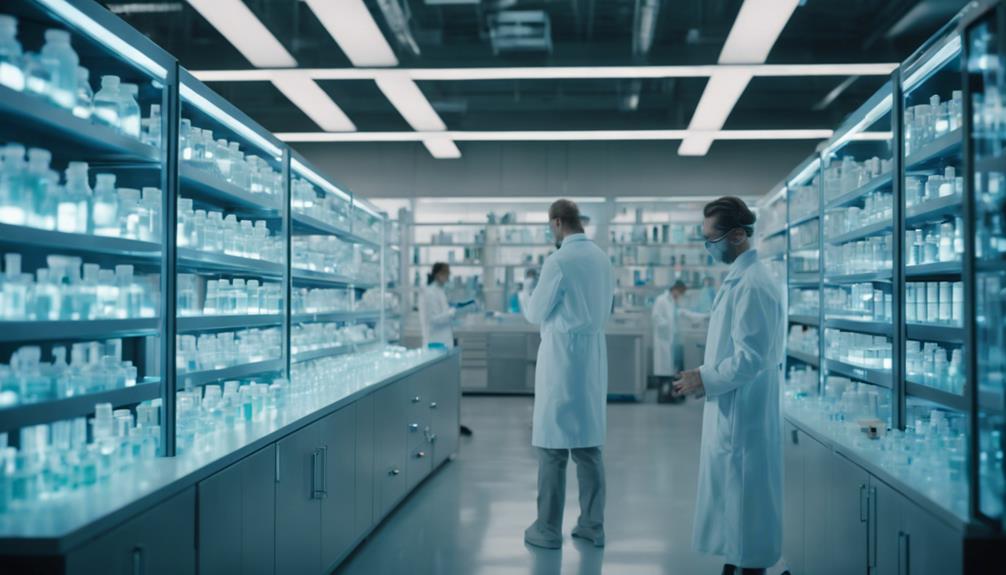AI has developed a cure for the common cold overnight, stunning pharmaceutical companies worldwide. By rapidly analyzing large datasets, AI pinpointed compounds that directly inhibit viral replication. This breakthrough marks a shift from traditional symptom relief methods to targeting the virus itself. The pharmaceutical industry is now grappling with the implications, as AI's efficiency challenges established drug development processes. Despite high failure rates in the past, this success could pave the way for faster, more effective treatments. Curious about what this means for the future of healthcare? There's much more to uncover regarding AI's role in medicine.
Key Takeaways
- AI has rapidly identified new antiviral compounds that directly target the cold virus, shifting focus from symptom relief to inhibiting viral replication.
- This breakthrough dramatically shortens drug discovery timelines, allowing the identification of effective candidates from years to just days.
- Major pharmaceutical companies are surprised and concerned about the capabilities of AI in drug development, prompting them to adapt their research strategies.
- Despite high failure rates of AI-generated drugs, successful treatments could reshape the pharmaceutical landscape and reduce the economic burden of colds.
Overview of AI in Healthcare
AI is revolutionizing healthcare by streamlining drug discovery and personalizing treatment options for patients. You'll see how pharmaceutical companies leverage AI technologies to considerably reduce the time needed to identify effective drug candidates, cutting the process from years to mere days. By employing machine learning and generative methods, these organizations can create novel drugs tailored to specific therapeutic targets.
AI systems analyze vast datasets of existing compounds, enabling the efficient identification of potential new drugs. Natural language processing (NLP) helps mine biomedical literature for insights, uncovering overlooked drug targets that traditional methods might miss. This integration of AI not only enhances the speed and accuracy of drug discovery but also supports the development of personalized medicine.
Through deep analysis of individual patient data, AI can match patients with the most suitable therapies based on their unique biological profiles, leading to improved outcomes. The investment in AI-driven drug development has surged, with biotech startups raising around $18 billion between 2012 and 2022, showcasing the growing confidence in AI's transformative power in healthcare.
This shift paves the way for more effective and personalized treatments in the future.
Breakthroughs in Cold Treatment

Recent advancements in drug discovery have led to promising breakthroughs in effectively treating the common cold. AI has played a vital role in this innovation, allowing researchers to identify new compounds that specifically target the cold virus. Unlike traditional cold treatments that focus on symptom relief, these AI-generated antiviral drugs aim to inhibit viral replication directly.
Here's a quick overview of the breakthroughs in cold treatment:
| Key Aspect | Details |
|---|---|
| Technology Used | AI and machine learning |
| Focus | Directly targeting viral replication |
| Speed | Rapid screening of thousands of compounds |
| Next Steps | Entering clinical trials to test effectiveness |
Pharmaceutical companies are now under pressure to innovate rapidly, as these new drugs could shift the cold treatment landscape dramatically. With the use of advanced algorithms, the time required for drug discovery has decreased considerably, paving the way for effective cold treatments that could soon be available to the public. If clinical trials prove successful, the common cold may finally meet its match.
Impact on Pharmaceutical Industry

The sudden emergence of an AI-developed cure for the common cold is set to revolutionize the pharmaceutical industry, challenging long-established drug development norms. Traditional drug companies typically spend over 10 years and billions developing treatments. However, this AI drug discovery breakthrough shows promise in drastically reducing both timelines and costs. AI technologies can screen millions of compounds rapidly, identifying effective drug candidates in mere days.
As you watch this shift unfold, you'll see increased pressure on pharmaceutical companies to adapt their research strategies. They'll need to integrate AI technologies into their workflows to stay competitive against innovative AI biotech firms that can bring solutions to market faster. If this AI-designed cure proves effective and gains regulatory approval, it could transform market dynamics, compelling established drug companies to rethink their development processes.
Moreover, the success of such treatments could spark renewed investments in AI-driven drug discovery. Biotech startups that previously garnered around $18 billion from 2012 to 2022 might attract even more funding as the industry recognizes the potential of AI to streamline the clinical trial process and accelerate the journey from lab to patient.
Challenges Facing AI Innovations

Many promising AI innovations in drug development still struggle with significant challenges that hinder their widespread adoption and effectiveness. The high failure rate of AI-generated drugs in clinical trials, where around 90% don't gain approval, poses a major issue. This stark reality emphasizes the unpredictability of drug interactions and the complexity of human biology, often making traditional trial-and-error methods more appealing.
Moreover, skepticism within pharmaceutical companies arises from the lack of independent verification for AI systems' claims, complicating their integration into established processes. Financial investment remains a barrier since optimizing AI drugs demands substantial resources.
Ethical concerns, including regulatory compliance and potential safety oversights, add another layer of complexity to innovation challenges.
| Challenge | Details |
|---|---|
| High Failure Rate | 90% of AI drugs fail in clinical trials |
| Financial Investment | Significant resources required for development |
| Ethical Concerns | Issues with safety and regulatory compliance |
Future of AI-Driven Drug Development

AI-driven drug development is set to revolutionize the pharmaceutical landscape by drastically shortening the timeline from drug discovery to clinical trials. You'll see how AI technologies, particularly generative AI, can analyze vast datasets in days, creating a wealth of candidate drugs that traditional methods might miss. This leap in efficiency allows pharmaceutical companies to produce viable compounds from thousands to millions, accelerating the entire process.
The integration of AI in medicinal chemistry enhances the precision of targeting those candidate drugs to specific patient populations, improving success rates in clinical trials. By analyzing biological and chemical data, AI can adapt strategies that consider individual immune system responses, making treatments more effective.
As advancements continue, the costs associated with R&D will likely decrease, fostering innovation in areas like resistant diseases. You can expect that the future of AI-driven drug development won't just be about speed; it'll also focus on creating smarter, more tailored therapies that directly address unmet medical needs, reshaping the entire pharmaceutical economic model.
Prepare for a future where AI not only accelerates drug development but also transforms the way we approach health and disease management.
Implications for Public Health

An AI-generated cure for the common cold could transform public health by greatly reducing the economic burden of respiratory illnesses and improving overall well-being. With the U.S. economy losing about $40 billion annually due to cold-related healthcare costs and lost productivity, this breakthrough could lighten that load markedly. You'd see fewer missed workdays and school absences, easing pressure on healthcare systems overwhelmed by millions of cases each year.
Moreover, AI's capability to quickly identify effective compounds can enhance our response to emerging viral strains, making public health preparedness more robust. A successful cold treatment might also shift perceptions about AI's role in healthcare, potentially increasing funding for AI research in pharmaceuticals and disease management.
This development could inspire researchers to explore treatments for other viral infections, paving the way for advancements against illnesses like influenza and COVID-19. As you witness the positive ripple effects of this AI-generated cure, it's clear that its implications extend far beyond just treating the common cold, ultimately reshaping how we approach public health and disease management.
Frequently Asked Questions
What Drug Was Developed Using Ai?
You'll learn that a new antiviral compound targeting the rhinovirus was developed using AI. This drug shows promise in reducing cold symptoms, showcasing how advanced technology can greatly streamline drug discovery and development processes.
What Is the Success Rate of AI Drug Discovery?
Isn't it astonishing how much promise AI holds in drug discovery? However, you should know that roughly 90% of drug candidates fail in clinical trials, so success rates remain challenging despite AI's potential to enhance efficiency.
How Is Amgen Using Ai?
Amgen's using AI to enhance drug discovery, analyzing vast datasets with machine learning. You'll see them identify new therapeutic targets and design innovative compounds, greatly speeding up the development of effective treatments for unmet medical needs.
Which Drug Discovery Company Uses Ai?
Many drug discovery companies use AI to enhance their processes. Exscientia, Insilico Medicine, Recursion Pharmaceuticals, Verseon, and AbSci are just a few examples where AI accelerates drug development and improves treatment precision for patients.
Conclusion
In a world where AI just cured the common cold overnight, you can't help but feel like you're living in a sci-fi novel!
This breakthrough shatters pharmaceutical norms, leaving companies scrambling like startled rabbits.
Sure, challenges remain, but the potential for AI-driven drug development is nothing short of revolutionary.
Imagine a future where sniffles are a thing of the past!
With public health on the rise, you're witnessing the dawn of a new era in medicine—buckle up!









